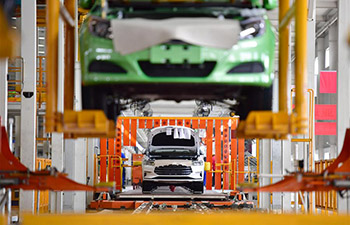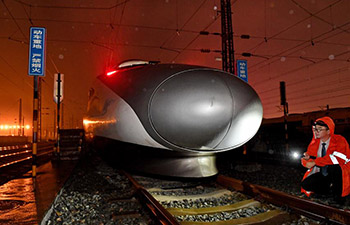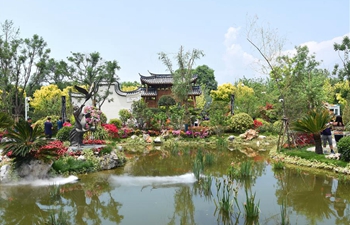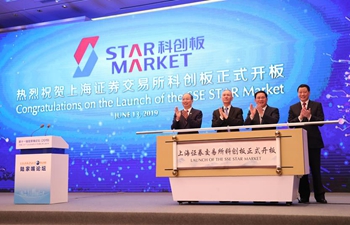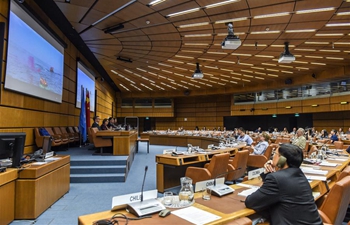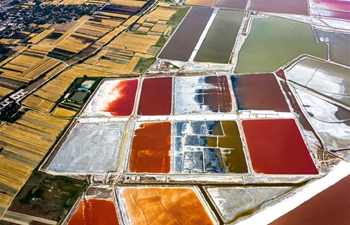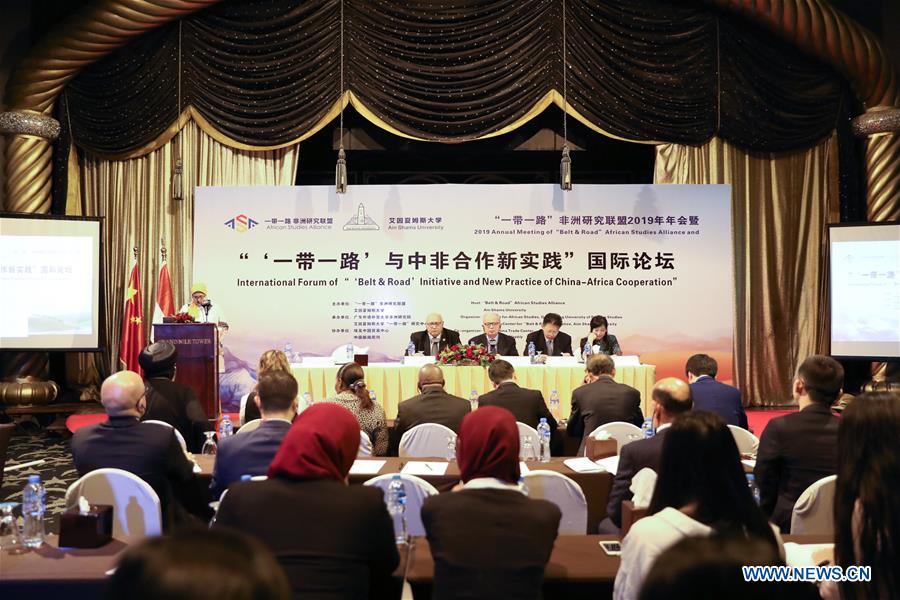
The International Forum of Belt and Road Initiative (BRI) and New Practices of China-Africa Cooperation is held in Cairo, Egypt, June 16, 2019. The two-day event kicked off Sunday in Cairo. Some 80 people attended the conference including government officials, entrepreneurs, experts, scholars and researchers from Nigeria, Kenya, China and Egypt. (Xinhua/Li Binian)
by Ahmed Shafiq
CAIRO, June 16 (Xinhua) -- The International Forum of Belt and Road Initiative (BRI) and New Practices of China-Africa Cooperation kicked off Sunday in the Egyptian capital Cairo.
The two-day event is hosted by the Belt and Road African Studies Alliance and Egypt's Ain Shams University and is organized by China's Institute for African Studies of Guangdong University of Foreign Studies and the Research Center for Belt and Road Initiative of Ain Shams University.
Some 80 people attended the conference including government officials, entrepreneurs, experts, scholars and researchers from Nigeria, Kenya, China and Egypt.
During the conference, experts and scholars will discuss China-Africa industrial promotion, the relation between Egypt's economy and China-Africa cooperation, China-Egypt cooperation under the framework of BRI.
They will also tackle industrialization, vocational career education development in African countries and new journey for cooperation in Belt and Road construction.
Proposed by China in 2013, the BRI refers to the Silk Road Economic Belt and the 21st Century Maritime Silk Road, which aims to build a trade and infrastructure network connecting Asia with Europe, Africa and beyond along the ancient trade routes of the Silk Road.
Speaking at the opening ceremony, Han Bing, minister counselor for economic affairs at the Chinese Embassy in Cairo, said the key to the achievements of the BRI is to conform to the trend of peace and development, adhere to the principle of achieving shared growth through discussion and collaboration.
"Against the background of the current anti-globalization trend and the rise of protectionism, the Belt and Road has issued a strong voice against unilateralism and protectionism," he stressed.
In the past six years, the cooperation under the BRI has been fruitful. The total trade volume of goods between China and the countries involved in the BRI has exceeded 5 trillion U.S. dollars, according to him.
The Chinese diplomat noted that Egypt is a natural partner in the construction of the BRI, pointing out that China-Egypt economic and trade cooperation has been elevated to a new height in recent years.
"The volume of bilateral trade and the quality of bilateral trade have improved. In 2018, the total trade volume exceeded 13.8 billion U.S. dollars, a record high. Egypt's exports to China have grown substantially, and agricultural products such as fresh oranges and grapes have continued to enter the Chinese market," Han added.
He highlighted that the financial cooperation between the two countries has continued to advance, noting that the number of Chinese tourists to Egypt has reached 400,000 in 2018, an increase of more than 30 percent.
"Egyptian President Abdel-Fattah al-Sisi pointed out at the Second Belt and Road Forum for International Cooperation in April this year that the goal of the initiative is consistent with Egypt's efforts to launch a series of large-scale projects with high returns and diversified investment opportunities," Han said.
As the African Union's presiding country in 2019, Egypt has played an important role in promoting China-Africa cooperation within the framework of the initiative, he said.
"We believe that as African Free Trade Zone takes effect this year, the prospects for China-Africa economic and trade cooperation will be even broader," He stressed.
Meanwhile, President of Ain Shams University, Abdel Wahab Ezzat, said his university, together with other universities engaged in Egyptian-Chinese and Afro-Sino cooperation, prepares studies about bilateral relations and areas of cooperation between the two countries.
"University is the home of knowledge and experiences. It is true that trade, politics and business control countries, but we need science to learn all these fields," he said.
He added that his university's Research Center for Belt and Road Initiative conducts economic, commercial and technical studies for projects and cooperation between Egypt and China.
"We may help implement our studies if we are asked to, but we mainly focus on preparing researches for Belt and Road and other mutual projects," he pointed out.
Founded in October 2018, Belt and Road African Studies Alliance is set up to implement the outcomes of Forum on China-Africa Cooperation (FOCAC) held in Beijing in September 2018.
Gathering professional researchers and institutes for African studies from all over the world, the alliance aims to serve as an interdisciplinary and cross-border communication platform to share resources, explore knowledge, disseminate technology, enhance understanding and promote applications.
The alliance now has 34 members, including 16 from African countries, 16 from China and two from Europe.




